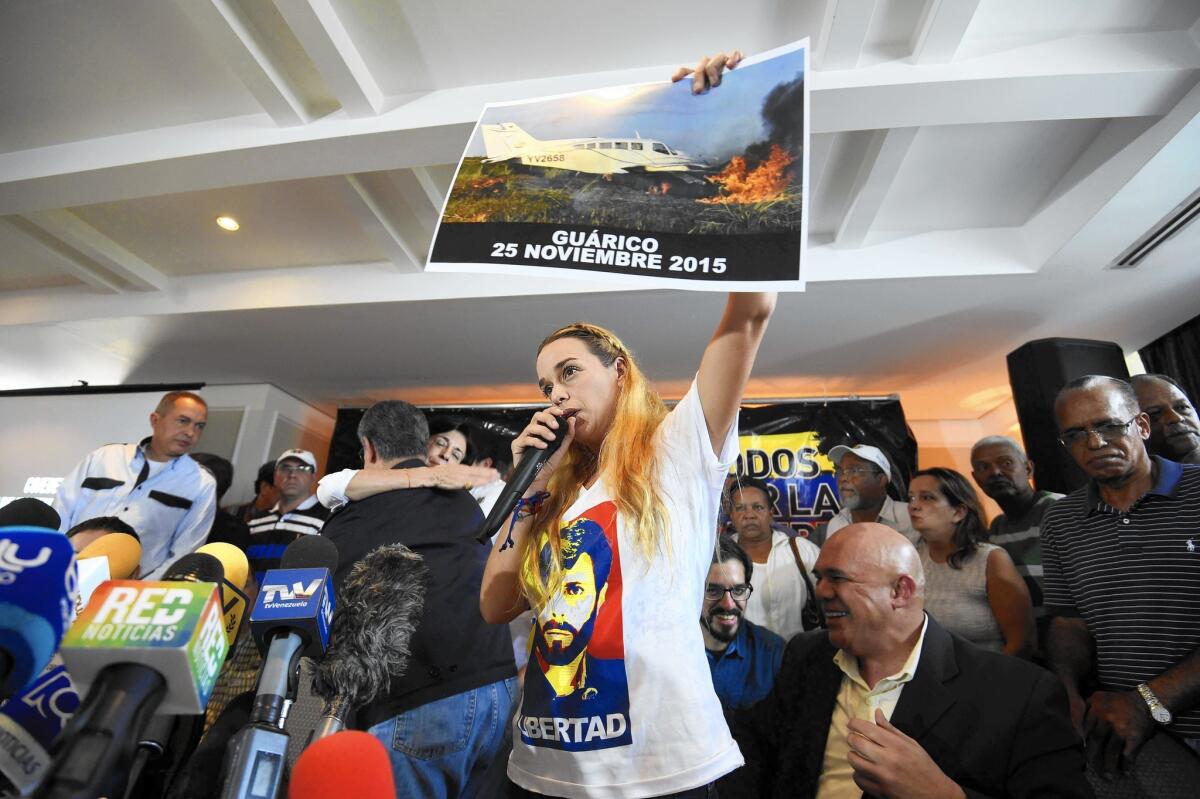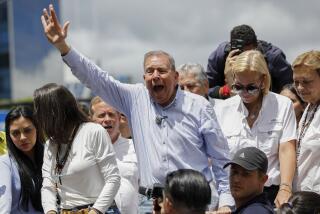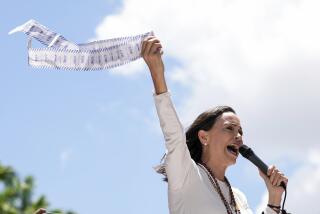Venezuelan opposition calls for investigation of official’s slaying

Reporting from CARACAS, Venezuela — Venezuela’s politics have long been volatile, but this week an opposition campaign official was gunned down at a rally, the latest in a series of violent incidents leading up to crucial Dec. 6 congressional elections.
Now opposition leaders are calling on President Nicolas Maduro to investigate the killing.
Tensions are running high before the vote to fill the National Assembly’s 165 seats. The United Socialist Party of Venezuela, or PSUV, founded by late President Hugo Chavez, has a majority, but recent polls indicate opposition candidates could make significant gains, if not win an outright majority.
Luis Manuel Diaz, a high-ranking local official in an alliance of parties that opposes Maduro, was fatally shot Wednesday as he left a campaign appearance in Altagracia de Orituco. Appearing with him at the event was Lilian Tintori, wife of jailed opposition leader Leopoldo Lopez.
Diaz, 44, was secretary general of the Democratic Action Party. He leaves his wife and two young children.
Early Wednesday, Tintori had said on Twitter that she was improperly detained “for hours” by government officials at an airport on Margarita Island in an attempt to keep her from attending the event in Guarico state, where Diaz was killed. Tintori is an outspoken critic of the government for the February 2014 jailing of her husband, a former Caracas borough mayor, and is actively campaigning for opposition candidates.
Diaz was shot by a gunman who opened fire from a car near the stage erected for the rally. No arrests have been made in the attack. Before the incident, some spectators had thrown rocks at the stage when both Tintori and Diaz were speaking, according to news reports.
In a news conference Thursday in Caracas, the nation’s capital, Tintori said she feels that her life is in danger and that perhaps the shot that killed Diaz was meant for her.
“I hold Nicolas Maduro responsible for the violent attacks suffered by members of the opposition,” Tintori said, adding that she thought the brakes of her aircraft had been tampered with, forcing her group to make an emergency landing in Guarico state.
In a statement issued Thursday, the U.S. State Department condemned the shooting as an “act of intimidation aimed at opposition candidates.”
The alliance of parties opposing Maduro and other Chavistas is known by the Spanish acronym MUD, for Democratic Unity Roundtable.
In a statement issued Thursday, alliance officials “blamed high state levels” for the attacks and said Diaz’s slaying was just one of half a dozen “situations of unacceptable violence” directed at opposition candidates and their supporters in recent days.
On the same day Diaz was killed, shots reportedly were fired at former presidential candidate and current Miranda state Gov. Henrique Capriles when he appeared at an event in Bolivar state for opposition candidates. Capriles claimed he was the victim of a similar attack Nov. 8 during an event in Yare and blamed the Chavista mayor, Saul Yanez.
Maduro on Thursday denied responsibility for the attacks, saying he had ordered an investigation into the shooting and theorized that the killing may have been the result of a “settling of scores” between rival gangs in the area.
“We are the guarantors of peace and I tell you that Chavistas will not fall victim to provocations,” Maduro told a rally in Guanare. He said he had information that opposition leaders were planning “acts of sabotage and acts of violence at campaign events” this weekend.
The opposition alliance renewed its call Thursday for foreign observers including the Organization of American States, the European Union and others to pressure Maduro to respect voting results on Dec. 6.
Polls indicate voter discontent with Maduro’s administration over triple-digit inflation, scarcities of basic foodstuffs and medicines and rising crime.
Maduro, who has predicted Chavistas will retain control of the assembly, has not allowed foreign groups to monitor the vote except for Unasur, an alliance of 12 Latin American nations largely funded by Venezuela’s government and whose 2004 formation was spearheaded by Chavez.
Special correspondents Mogollon and Kraul reported from Caracas and Bogota, Colombia, respectively.
More to Read
Sign up for Essential California
The most important California stories and recommendations in your inbox every morning.
You may occasionally receive promotional content from the Los Angeles Times.









